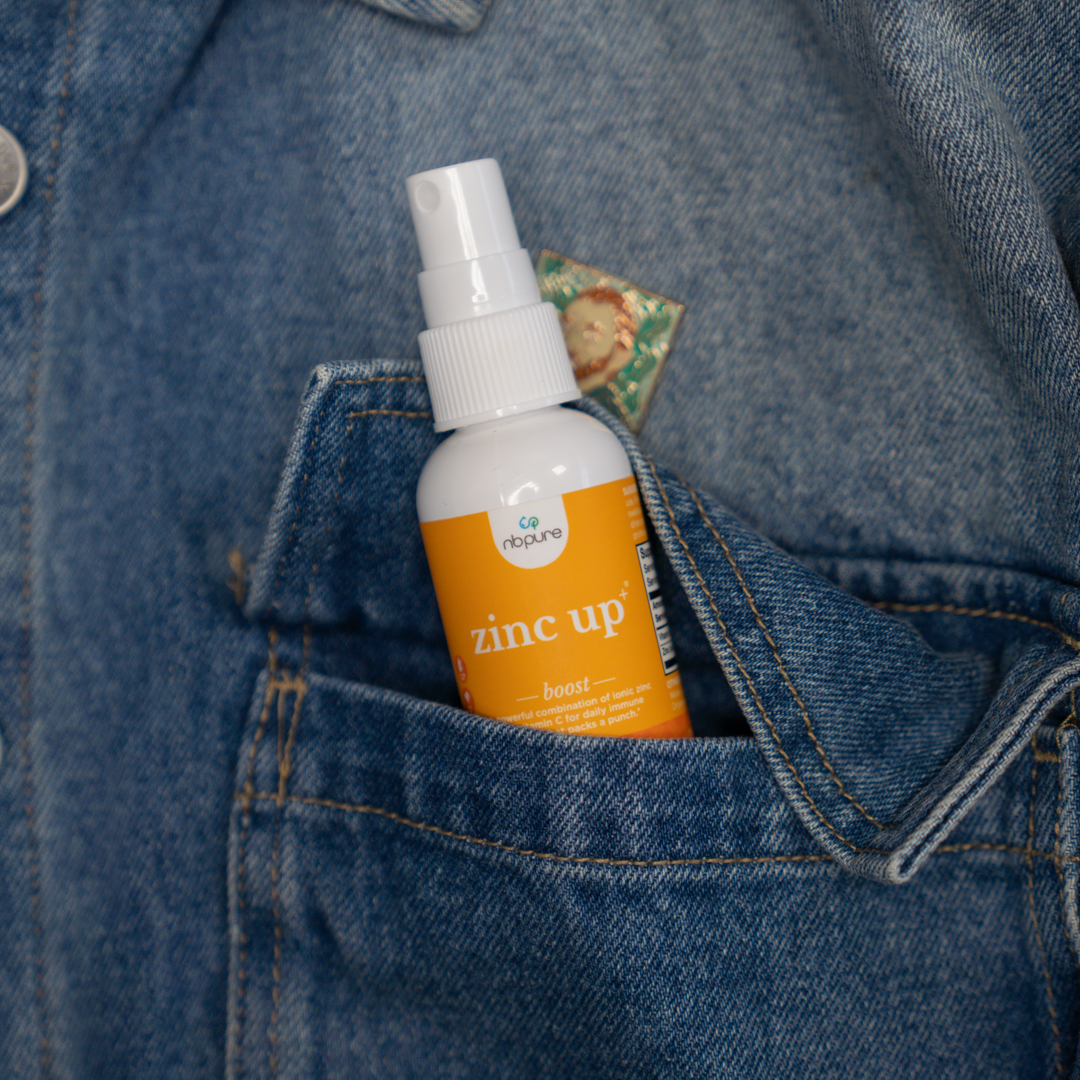Written by Team NB Pure on October 4, 2021.
Medical Data Sourced from National Institute of Health
Zinc is a nutrient that plays many vital roles in your body.
The human body does not naturally produce zinc. Because it is a very important nutrient, you must obtain it through supplements or through food.
This article will explain everything that you need to know about zinc. It has the medical data attached to it as well. It discusses the functions and health benefits.

Zinc is considered an essential nutrient.
This means that your body can not product or store it.
This is the reason that people must get a constant supply through their diet and supplements.
Zinc is required for numerous processes in the body, including(1):
-
Wound healing
-
Growth and development
-
Immune function
-
Protein synthesis
-
DNA synthesis
-
Gene expression
-
Enzymatic reactions
Zinc is naturally found in a wide variety of both plant and animal foods.
Foods like breakfast cereals, snack bars, baking flour are often fortified with synthetic forms of zinc because they do not naturally contain it.
You can also take zinc supplements that provide the zinc for you.

Zinc and Immunity
Because of its role in immune function, zinc is likewise added to some nasal sprays, lozenges and other natural cold treatments.
Zinc is a vital mineral that your body uses in countless ways.
In fact, zinc is the second-most-abundant trace mineral in your body — after iron— and is present in every cell (2).
Zinc is necessary for the activity of over 300 enzymes that aid in metabolism, digestion, nerve function and many other processes.
In addition, it’s critical for the development and function of immune cells.
This mineral is also fundamental to skin health, DNA synthesis and protein production.
What’s more, body growth and development relies on zinc because of its role in cell growth and division.
Zinc is also needed for your senses of taste and smell. Because one of the enzymes crucial for proper taste and smell is dependent on this nutrient, a zinc deficiency can reduce your ability to taste or smell.
Health Benefits
Research shows that zinc has numerous health benefits.
1. Zinc can prevent colds, flu and infections by boosting immunity.
Zinc helps keep your immune system strong.
Because it is necessary for immune cell function and cell signaling, a deficiency can lead to a weakened immune response.
Zinc supplements stimulate particular immune cells and reduce oxidative stress.
For example, a review of seven studies demonstrated that 80–92 mg per day of zinc may reduce the length of the common cold by up to 33%.
What’s more, zinc supplements significantly reduce the risk of infections and promote immune response in older adults.
2. Zinc can help our skin stay healthy, speeding up would healing
Zinc is commonly used in hospitals as a treatment for burns, certain ulcers and other skin injuries.
Because this mineral plays critical roles in collagen synthesis, immune function and inflammatory response, it is necessary for proper healing.
In fact, your skin holds a relatively high amount — about 5% — of your body’s zinc content.
While a zinc deficiency can slow wound healing, supplementing with zinc can speed recovery in people with wounds.
For example, in a 12-week study in 60 people with diabetic foot ulcers, those treated with 200 mg of zinc per day experienced significant reductions in ulcer size compared to a placebo group.
3. May Reduce the Risk of Certain Age-Related Diseases
Zinc may significantly reduce your risk of age-related diseases, such as pneumonia, infection and age-related macular degeneration (AMD).
Zinc may relieve oxidative stress and improve immune response by boosting the activity of T-cells and natural killer cells, which help protect your body from infection.
Older adults who supplement with zinc experience improved influenza vaccination response, reduced risk of pneumonia and boosted mental performance.
In fact, one study determined that 45 mg per day of zinc may decrease infection rates in older adults by nearly 66%.
Additionally, in a large study in over 4,200 people, taking daily antioxidant supplements — vitamin E, vitamin C and beta-carotene — plus 80 mg of zinc decreased vision loss and significantly reduced the risk of advanced AMD.
4. May Help Treat Acne
Acne is a common skin disease that is estimated to affect up to 9.4% of the global population.
Acne is driven by obstruction of oil-producing glands, bacteria and inflammation.
Studies suggest that both topical and oral zinc treatments can effectively treat acne by reducing inflammation, inhibiting the growth of P. acnes bacteria and suppressing oily gland activity.
People with acne tend to have lower levels of zinc. Therefore, supplements may help reduce symptoms.
5. Decreases Inflammation
Zinc decreases oxidative stress and reduces levels of certain inflammatory proteins in your body.
Oxidative stress leads to chronic inflammation, a contributing factor in a wide array of chronic illnesses, such as heart disease, cancer and mental decline.
In a study in 40 older adults, those who took 45 mg of zinc per day experienced greater reductions in inflammatory markers than a placebo group.
Deficiency Symptoms
Although severe zinc deficiency is rare, it can occur in people with rare genetic mutations, breastfeeding infants whose mothers don’t have enough zinc, people with alcohol addictions and anyone taking certain immune-suppressing medications.
Symptoms of severe zinc deficiency include impaired growth and development, delayed sexual maturity, skin rashes, chronic diarrhea, impaired wound healing and behavioral issues.
Milder forms of zinc deficiency are more common, especially in children in developing countries where diets are often lacking in important nutrients.
It is estimated that around 2 billion people worldwide are deficient in zinc due to inadequate dietary intake.
Since zinc deficiency impairs your immune system — increasing the chances of infection — zinc deficiency is thought to cause over 450,000 deaths in children under 5 every year.
Those at risk of zinc deficiency include:
-
People with gastrointestinal diseases like Crohn’s disease
-
Vegetarians and vegans
-
Pregnant and breastfeeding women
-
Older infants who are exclusively breastfed
-
People with sickle cell anemia
-
People who are malnourished, including those with anorexia or bulimia
-
People with chronic kidney disease
-
Those who abuse alcohol
Symptoms of mild zinc deficiency include diarrhea, decreased immunity, thinning hair, decreased appetite, mood disturbances, dry skin, fertility issues and impaired wound healing.
Zinc deficiency is difficult to detect using laboratory tests due to your body’s tight control over zinc levels. Thus, you may still be deficient even if tests indicate normal levels.
Doctors consider other risk factors — such as poor dietary intake and genetics — alongside blood results when determining whether you need supplements.
The Wrap Up
Zinc is needed for DNA synthesis, immune function, metabolism, and growth.
It may reduce inflammation and your risk of some age-related diseases.
Most people meet the RDI of 11 mg for men and 8 mg for women through diet, but older adults and people with diseases that inhibit zinc absorption may need to supplement.
Our choice for Zinc Supplement is here.








